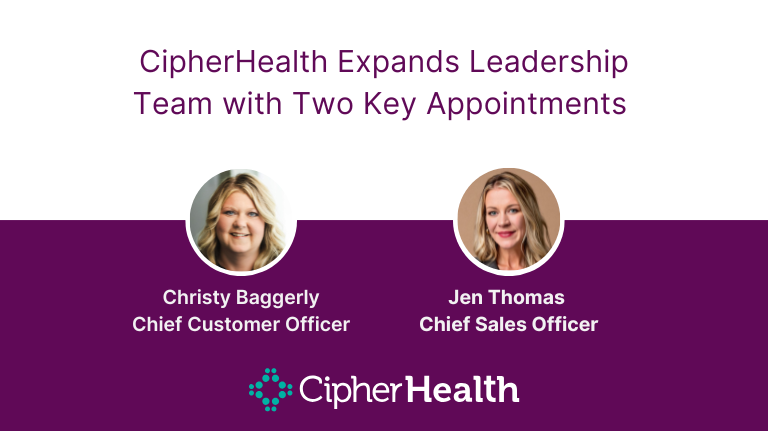Challenges and Opportunities in Patient Engagement
CipherHealth CEO Jake Pyles and CMO Jim Somers discuss the challenges Jake is hearing from health systems on the ground – staff burnout, consumerism, and a change in competitive landscape – and how to tackle them. Jake also shares what he hears about changing patient expectations, and how CipherHealth can help health systems build loyalty. They go on to discuss how Covid has changed the bureaucracy and fragmentation of healthcare, rising healthcare costs – and what makes CipherHealth stands out. Watch now.
Challenges Facing the Healthcare Industry
Interviewer: I’m thrilled to be here today with Cipherhealth’s CEO Mr. Jake Pyles to talk about the many challenges and opportunities facing the healthcare industry today, and how health systems and providers can use patient engagement technologies to address them. Jake, you talk with customers every day, what are you hearing from them and what are some of the challenges and the opportunities that they’re dealing with today?
CEO Jake Pyles: As you said, I have a unique opportunity to talk to many different leaders across many leading healthcare systems across the U.S. on a daily, weekly basis and there have been over the last six to nine months several themes that have been consistent across those conversations. One that comes up first in almost every conversation I have is the nursing crisis, and staff shortages, and burn out. I think the industry recognizes that this problem existed pre-COVID and they knew that the supply of nurses on the horizon is not going to be sufficient for the industry’s demand or needs, and now COVID has exacerbated that problem and is leading to many nurses to leave the profession or retire early, and I think the industry also recognizes that it has played a part in some of that burn out. With the technology that they have put in place across the care continuum, the collage in using 10-15 vendors across the care continuum is not providing what the nurse needs to do her job more effectively. I mean nurses at the end of the day want to be clinical care providers, they don’t want to be doing administrative tasks, you hear stories about nurses having to do appointment reminders, pre-arrival instructions, post-discharge outreach, all manual in nature and it’s just inefficient and technology can be used to take those administrative tasks off their plates.
Another big topic that comes up quite consistently is this area of consumerism. I think many C-Suite execs in healthcare systems are recognizing that the expectations of how the patient/consumer-you’re hearing ‘consumer’ more and more in the way they describe the patient – is beginning to change. I think they know that the experiences that the consumer is having in other spaces, your airline, your hotel, your bank, whatever it may be, that the digital engagement experience you’re having in those areas where they know who you are, they know what your interests are, they’re serving things up to you, they’re making the experience seamless and frictionless. They know that those expectations are now beginning to spill over into healthcare, and there are players starting to appear that they’re making strides in those areas. So you’re hearing more of them recognize we’ve got to up our game as it relates to digital engagement and that’s becoming a priority and it kind of ties in to the third big theme that I hear which is a changing competitive landscape. A lot of them, their eyes have been opened to the moves made by Amazon and Amazon Care, Walmart and its health hubs, Optum opening 2,500 ambulatory clinics across the nation, CVS Aetna, you could go on and on, but it is clear that the primary care model is being disrupted and I think that we believe that he who has the primary care relationship with the patient is going to understand a lot about what that patient needs, wants, and with that understanding they’re going to be able to steer, guide, and direct where they go for additional services. So a lot of them are talking about how do we engage that patient? How do keep them engaged in our network? How do we create loyalty to them, and not expose them to some of these new entrants into those areas? So creating more need to engage us to help them do that.
Digital Transformation of the Healthcare Industry
Interviewer: It feels like today is a perfect storm, you’ve got the rising patient expectations, you’ve got the staffing issues, and the revenue constraints that systems have been dealing with, and not least of all we have COVID that is bringing all of this to the forefront and it’s really accelerating the need for healthcare to digitally transform. So what is it about this digital transformation that is, are people, new roles being introduced to really address this, how are people tackling this problem within the healthcare system?
CEO Jake Pyles: I think to your point COVID has exposed the fragility and in some ways kind of the bureaucracy of healthcare, and you’ve seen many systems kind of rethink how they go about making decisions, and when you look at pre-COVID there were a lot of committees involved in decision making, you’ve seen some of that break down through COVID because you can’t go through a committee decision making process when you’re having to make decisions in days, not weeks.
Interviewer: I recently read somewhere that healthcare costs are about 18% of GDP, I mean that’s not sustainable right?
CEO Jake Pyles: I think we as a nation have to recognize this is to some degree a crisis. I actually read a report this week, two different interesting data points. One, there are people now saying that in 2021 they think it might have been 20% of GDP, so as a country this is not a sustainable model, and back to what COVID has done, I think it has exposed us as a system where people refer to us as fee-for-service but it is a reactive system, it is treating the condition that exists, and what I think we have to do is begin to rethink that and build a healthcare system and a patient engagement model that is proactive about managing the patient through their healthcare journey.
Why Should Healthcare Systems Choose CipherHealth?
Interviewer: This is all very exciting but there are literally hundreds of companies out there in this patient engagement technology space, why should healthcare systems listen to us?
CEO Jake Pyles: Well as you look at CipherHealth, I think we are uniquely positioned because no one else in this space can say that they work with the type of providers we work with. We have 350 of the top healthcare systems in the U.S. and growing, we’re adding to that list on a weekly basis but the breadth of the healthcare system that we cover and work with is unparalleled and unmatched frankly in this space, so that’s one. Two, we have over a decade working in key areas like rounding and post-discharge outreach, a deep history and understanding of what works and doesn’t work in those respective areas so we have been working on compiling and building a best practices approach to those two areas and expanding it to other areas. So I think it’s like I said, the type of leaders in the healthcare system that we work with today looking to us to manage some of these key areas of their clinical workflows and the knowledge base that we have built around that, no one else has that today. So we are in a unique position as a result of that
Interviewer: Well Jake this has been really great, appreciate your time today in sharing your thoughts about what you’re hearing from customers, the experiences that they’re having, how they’re using our software; and if any of you would like to learn more about CipherHealth and our solutions please visit us online at www.cipherhealth.com and come visit our blog, read our stories, and read our many case studies as well. So thank you for your time today and we’ll see you soon.





